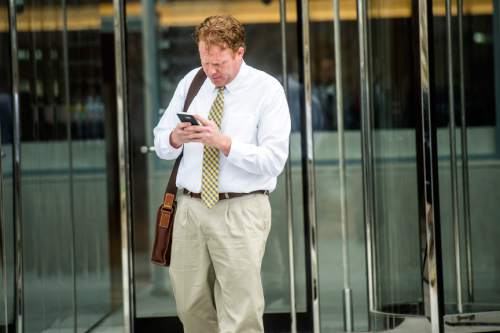This is an archived article that was published on sltrib.com in 2016, and information in the article may be outdated. It is provided only for personal research purposes and may not be reprinted.
Jeremy Johnson made his first appearance Monday acting as his own attorney in the federal court criminal case against him — and the results weren't in his favor.
With just a week to go before final jury selection is to begin, the St. George businessman appeared in court representing himself to argue that the government should not be allowed to use at trial testimony or evidence from the former corporate counsel for Johnson's I Works company.
Johnson recently opted to dismiss his court-appointed attorneys and act as his own counsel for the trial expected to last as many as six weeks. A co-defendant, Ryan Riddle, also ditched his court-appointed lawyers and appeared Monday for the first time as his own attorney.
Both questioned a witness, former I Works counsel Phillip Gubler, about his relationship with them and with the company. Attorney Marcus Mumford also queried Gubler on behalf of his client, Scott Leavitt, a former I Works employee who is also a co-defendant.
The three argued that communication with Gubler was private because it involved an attorney-client relationship.
U.S. District Judge David Nuffer ruled otherwise, citing actions in a lawsuit brought by the Federal Trade Commission in U.S. District Court in Nevada against Johnson, I Works and others in which Gubler gave a deposition and documents involving Johnson were introduced.
But Johnson told the judge he had been forced to turn over documents involving Gubler against his will by a court order and that federal prosecutors in Utah then took advantage of that to grab evidence, even though Johnson considered the documents to be private attorney-client communications or work product. Johnson started acting as his own attorney in the Nevada case after a court-appointed receiver seized his assets and those if I Works, his online marketing company.
"I understand your feelings, Mr. Johnson, but what's done is done," Nuffer said. "... It's been disclosed. It's out in the public. You can't unring it."
Jury selection is expected to last a week with opening arguments Feb. 8.
Johnson and three others from I Works face 86 counts that revolve around whether the defendants committed bank fraud by creating "shell companies" and using them to obtain new merchant accounts so they could continue to charge credit cards after I Works landed on lists of companies with high levels of consumer chargebacks.
In a motion filed Monday, Mumford said that evidence gathered in the case shows that the new accounts were not held by Wells Fargo Bank as prosecutors have alleged but rather involved a separate company, Wells Fargo Merchant Services LLC, owned jointly by Wells Fargo and First Data Corp.
Since the joint company is not a bank, Mumford argued that there was no bank fraud.
Wells Fargo Bank "did not sign the merchant account agreements at issue, have any role in setting up those merchant accounts, hold any of the reserves associated with those merchant accounts, or have any role in operating those merchant accounts," Mumford argued in his motion.
Federal prosecutors said they would respond to the motion by Tuesday, and Nuffer gave Mumford until Wednesday to file a reply.



